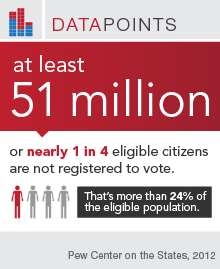Inaccurate Voter Registrations
Return to Election Data Dispatches.
At least 51 million eligible citizens—more than 24 percent of the eligible population—still are not registered to vote, according to a new report from the Pew Center on the States’ Election Initiatives. The analysis, Inaccurate, Costly, and Inefficient, found that approximately 24 million active voter registrations in the United States—one of every eight—are no longer valid or have significant inaccuracies.

The report highlights the need for registration systems that use the latest technology to better maintain voter records, save money, and streamline processes. Eight states—Colorado, Delaware, Maryland, Nevada, Oregon, Utah, Virginia, and Washington—are spearheading this effort with Pew’s support.






